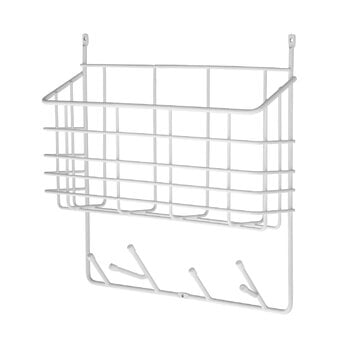The Mitten Shelf, designed by Olof Kolte for Maze, is a compact yet versatile wall-mounted coat rack made of recycled metal. Mitten Shelf's hooks provide storage space for coats and bags, and the small basket on top keeps your mittens, scarfs and hats easily reachable. Besides the hallway, the Mitten Shelf makes a useful storage item for instance in the kitchen or bedroom.
Mitten Shelf, S, white
Maze
Description
The Mitten Shelf, designed by Olof Kolte for Maze, is a compact yet versatile wall-mounted coat rack made of recycled metal. Mitten Shelf's hooks provide storage space for coats and bags, and the small basket on top keeps your mittens, scarfs and hats easily reachable. Besides the hallway, the Mitten Shelf makes a useful storage item for instance in the kitchen or bedroom.
Product details (6)
- Material
- Powder coated metal
- Colour
- White
- Width
- 38.6 cm
- Depth
- 8.6 cm
- Height
- 35.2 cm
- Notes
- Screws not included.
Designer
Olof Kolte (b. 1964) is a Swedish designer whose design philosophy emphasizes ecological sustainability and the use of recycled materials. Kolte has a background in engineering, and he has studied architecture and design at London’s Royal College of Art and Copenhagen’s Royal Academy of Fine Arts. Besides a designer, Kolte is also a lecturer of Industrial Design at the Lund University, Sweden.
View all productsReviews (0)
Sustainability
The Product Sustainability Framework, our criteria of sustainable design, helps you find the most sustainable products in our selection. Read below which sustainability criteria this product has met.
Working conditions & labour 6/9
-
Equal opportunities for all employees
-
Commitment to UN Global Compact, fair compensation for all employees
-
Corporate responsibility requirements defined and communicated for suppliers
-
Systematic work for improved inclusion and well-being in the workplace
-
Transparent supply chain
-
Suppliers' compliance to a code of conduct ensured
-
Direct suppliers audited and certified
-
Compliance to the UN Guiding Principles on Business and Human Rights ensured in the supply chain
-
Support for community involvement in the supply chain
Eco-friendly production 7/9
-
Fair and resource-wise water-use in production
-
No incineration or landfilling of returned items
-
No use of endangered species as materials
-
No direct environmental emissions or waste (excl. GHGs) from production
-
The sustainability of direct suppliers' production is addressed and monitored
-
Material-efficient and ecological packaging
-
No potentially harmful chemicals used in own production
-
Production and material sourcing that respect biodiversity, animal rights, and natural ecosystems
-
Positive impact on nature’s well-being through operations that regenerate natural ecosystems
Climate impact 3/8
-
Company's direct greenhouse gas emissions identified and commitment to reduction
-
Product's carbon impact identified and commitment to reduction
-
Guidance on energy- and eco-efficient use of the product
-
Contribution to climate initiatives beyond the brand’s direct operations
-
Low-carbon or compensated transportation
-
Carbon footprint of the product calculated and goals set to reduce it
-
100 % renewable energy in own production and operations
-
Carbon neutral or carbon negative product
Sustainable materials 6/6
-
Sustainable and long-lasting material choices
-
No harmful or hazardous substances
-
Responsible raw material sourcing and production
-
Materials suited for circularity: monomaterials, recyclable finishings, renewable or recycled contents etc.
-
Ecological materials: natural, biodegradable, recyclable or recycled contents
-
Outstanding materials in terms of innovativeness, responsibility, sustainability and circularity: local production or sourcing, 100 % recycled content, C2C-certification etc.
Circular design 4/5
-
High aesthetic quality promoting long-term use of the product
-
Technically durable product design and material choices
-
Design for enduring life-long quality
-
Design and support for product maintenance, repair and upgradability
-
Innovative circular design solutions: circular service system, resale platform, remanufacturing, collection of used products, etc.
Chat to us online
Please enable functional cookies to use this feature. You can change your cookie settings at any time.





